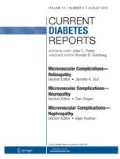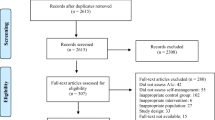Abstract
Research on the role of behavior change as an efficacious intervention for adults with type 2 diabetes is evolving. Searching PubMed and Ovid Medline, we identified and reviewed primarily randomized controlled trials from 2010 to 2013 of adults managing type 2 diabetes without insulin. All studies are evaluated in terms of the rigor of their design and their impact on glycosylated hemoglobin. The most efficacious interventions appear to be low-carbohydrate/glycemic load diets, combined aerobic and resistance training, and self-monitoring of blood glucose, which educates patients about the impact of their food selections and physical activity on their blood glucose.
Similar content being viewed by others
References
Papers of particular interest, published recently, have been highlighted as: • Of importance •• Of major importance
Nathan DM, Buse JB, Davidson MB, et al. Medical management of hyperglycemia in type 2 diabetes: a consensus algorithm for the initiation and adjustment of therapy: a consensus statement of the American Diabetes Association and the European Association for the Study of Diabetes. Diabetes Care. 2009;32(1):193–203.
Inzucchi SE, Bergenstal RM, Buse JB, et al. Management of hyperglycemia in type 2 diabetes: a patient-centered approach: position statement of the American Diabetes Association (ADA) and the European Association for the Study of Diabetes (EASD). Diabetes Care. 2012;35(6):1364–79.
Appendix: Jadad scale for reporting randomized controlled trials. In: Halpern SH, Douglas MJ, editors. Evidence-based obstetric anesthesia. Oxford: Blackwell Publishing Ltd; 2007, pp. 237–238.
Westman EC, Yancy Jr WS, Humphreys M. Dietary treatment of diabetes mellitus in the pre-insulin era (1914–1922). Perspect Biol Med. 2006;49(1):77–83.
Wheeler ML, Dunbar SA, Jaacks LM, et al. Macronutrients, food groups, and eating patterns in the management of diabetes: a systematic review of the literature, 2010. Diabetes Care. 2012;35(2):434–45.
Ajala O, English P, Pinkney J. Systematic review and meta-analysis of different dietary approaches to the management of type 2 diabetes. Am J Clin Nutr. 2013;97:505–16.
Elhayany A, Lustman A, Abel R, et al. A low carbohydrate Mediterranean diet improves cardiovascular risk factors and diabetes control among overweight patients with type 2 diabetes mellitus: a 1-year prospective randomized intervention study. Diabetes Obes Metab. 2010;12(3):204–9.
Guldbrand H, Dizdar B, Bunjaku B, et al. In type 2 diabetes, randomization to advice to follow a low-carbohydrate diet transiently improves glycaemic control compared with advice to follow a low-fat diet producing a similar weight loss. Diabetologia. 2012;55(8):2118–27.
Jenkins DJ, Kendall CW, Banach MS, et al. Nuts as a replacement for carbohydrates in the diabetic diet. Diabetes Care. 2011;34(8):1706–11.
Hussain TA, Matthew TC, Dashti AA, et al. Effect of low-calorie versus low-carbohydrate ketogenic diet in type 2 diabetes. Nutrition. 2012;28(10):1016–21.
Sasakabe T, Haimoto H, Umegaki H, Wakai K. Effects of a moderate low-carbohydrate diet on preferential abdominal fat loss and cardiovascular risk factors in patients with type 2 diabetes. Diabetes Metab Syndr Obes. 2011;4:167–74.
Fabricatore AN, Wadden TA, Ebbeling CB, et al. Targeting dietary fat or glycemic load in the treatment of obesity and type 2 diabetes: a randomized controlled trial. Diabetes Res Clin Pract. 2011;92(1):37–45.
Jenkins DJ, Kendall CW, Augustin LS, et al. Effect of legumes as part of a low glycemic index diet on glycemic control and cardiovascular risk factors in type 2 diabetes mellitus: a randomized controlled trial. Arch Intern Med. 2012;172(21):1653–60.
Ziaee A, Afaghi A, Sarreshtehdari M. Effect of low glycemic load diet on glycated hemoglobin (HbA1c) in poorly-controlled diabetes patients. Global J Health Sci. 2011;4(1):211–6.
Jenkins DJ, Srichaikul K, Kendall CW, et al. The relation of low glycaemic index fruit consumption to glycaemic control and risk factors for coronary heart disease in type 2 diabetes. Diabetologia. 2011;54(2):271–9.
Turner-McGrievy GM, Jenkins DJ, Barnard ND, et al. Decreases in dietary glycemic index are related to weight loss among individuals following therapeutic diets for type 2 diabetes. J Nutr. 2011;141:1469–74.
Krebs JD, Elley CR, Parry-Strong A, et al. The Diabetes Excess Weight Loss (DEWL) Trial: a randomized controlled trial of high-protein versus high-carbohydrate diets over 2 years in type 2 diabetes. Diabetologia. 2012;55:905–14.
Larsen RN, Mann NJ, Maclean E, Shaw JE. The effect of high-protein, low-carbohydrate diets in the treatment of type 2 diabetes: a 12 month randomized controlled trial. Diabetologia. 2011;54:731–40.
Esposito K, Maiorino MI, Di Palo C, et al. Dietary glycemic index and glycemic load are associated with metabolic control in type 2 diabetes: the CAPRI experience. Metab Syndr Relat Disord. 2010;8(3):255–61.
•• Church TS, Blair SN, Cocreham S, et al. Effects of aerobic and resistance training on hemoglobin A1c levels in patients with type 2 diabetes: a randomized controlled trial. JAMA. 2010;304(20):2253–62. Strengths of trial include duration, large and diverse population, and standardization of its exercise programs.
•• Balducci S, Zanuso S, Nicolucci A, et al. Effect of an intensive exercise intervention strategy on modifiable cardiovascular risk factors in subjects with type 2 diabetes mellitus. Arch Intern Med. 2010;170(20):1794–803. Rigorous trial that supports the recommendation of combined aerobic and resistance exercise regimen as most beneficial in maximizing glycemic control in sedentary patients with diabetes.
Ng CL, Goh SY, Malhotra R, et al. Minimal difference between aerobic and progressive resistance exercise on metabolic profile and fitness in older adults with diabetes mellitus: a randomized trial. J Physiother. 2010;56(3):163–70.
Plotnikoff RC, Eves N, Jung M, et al. Multicomponent, home-based resistance training for obese adults with type 2 diabetes: a randomized controlled trial. Int J Obes (Lond). 2010;34(12):1733–41.
• Braun B, Eze P, Stephens BR, et al. Impact of metformin on peak aerobic capacity. Appl Physiol, Nutr, Metabol = Physiol Appl, Nutr Metabol. 2008;33(1):61–7. Findings elucidate the need for comprehensive treatment of diabetes, as opposed to drug therapy alone.
Kadoglou NP, Iliadis F, Sailer N, et al. Exercise training ameliorates the effects of rosiglitazone on traditional and novel cardiovascular risk factors in patients with type 2 diabetes mellitus. Metabol: Clin Exp. 2010;59(4):599–607.
• Colberg SR, Sigal RJ, Fernhall B, et al. Exercise and type 2 diabetes: the American College of Sports Medicine and the American Diabetes Association: joint position statement. Diabetes Care. 2010;33(12):e147–67. Article contains information of importance to all clinicians working with persons at risk for metabolic syndrome and/or diagnosed with diabetes.
Kleefstra N, Hortensius J, Logtenberg SJ, et al. Self-monitoring of blood glucose in tablet-treated type 2 diabetic patients (ZODIAC). Neth J Med. 2010;68:311–6.
Farmer AJ, Perera R, Ward A, et al. Meta-analysis of individual patient data in randomized trials of self monitoring of blood glucose in people with non-insulin treated type 2 diabetes. BMJ. 2012;344:e486.
Malanda UL, Welschen LMC, Riphagen II, et al. Self-monitoring of blood glucose in patients with type 2 diabetes mellitus who are not using insulin. Cochrane Database Syst Rev. 2012;1:CD005060.
Polonsky WH, Fisher L. Self-monitoring of blood glucose in noninsulin-using type 2 diabetic patients: right answer, but wrong question: self-monitoring of blood glucose can be clinically valuable for noninsulin users. Diabetes Care. 2013;36:179–82.
Schnell O, Alawi H, Battelino T, et al. Self-monitoring of blood glucose in type 2 diabetes: recent studies. J Diabetes Sci Technol. 2013;7(2):478–88.
Evans JM, Mackison D, Swanson V, et al. Self-monitoring among non-insulin treated patients with type 2 diabetes mellitus: patients’ behavioural responses to readings and associations with glycemic control. Diabetes Res Clin Pract. 2013. doi:10.1016/jdiabres.2013.03.005.
Parkin CG, Buskirk A, Hinnen DA, Axel-Schweitzer M. Results that matter: structured vs. unstructured self-monitoring of blood glucose in type 2 diabetes. Diabetes Res Clin Pract. 2012;97:6–15.
Polonsky WH, Fisher L, Schikman CH, et al. Structured self-monitoring of blood glucose significantly reduces A1C levels in poorly controlled, noninsulin-treated type 2 diabetes: results from the Structured Testing Program study. Diabetes Care. 2011;34(2):262–7.
Lalic N, Tankova T, Nourredine M, et al. Value and utility of structured self-monitoring of blood glucose in real world clinical practice: findings from a multinational observational study. Diabetes Technol Ther. 2012;14(4):338–43.
Bosi E, Scavini M, Ceriello A, et al. Structured SMBG improves HbA1c through targeted changes in diabetes therapy in patients with non-insulin treated type 2 diabetes: the PRISMA study [Abstract]. Retrieved from the American Diabetes Association 72nd Scientific Sessions website: http://www.abstractsonline.com/Plan/AuthorIndex.aspx?letters=BO.
Foster GD, Wadden TA, Lagrotte CA, et al. A randomized comparison of a commercially available portion-controlled weight-loss intervention with a diabetes self-management education program. Nutr Diabetes. 2013;3:e63.
• Luley C, Blaik A, Reschke K, et al. Weight loss in obese patients with type 2 diabetes: effects of telemonitoring plus a diet combination – the Active Body Control (ABC) Program. Diabetes Res Clin Pract. 2011;91(3):286–92. LM education combined with telemonitoring can lower weight, HbA1C, and diabetes drug use in individuals with T2D.
•• Look AHEAD Research Group, Wing RR. Long-term effects of a lifestyle intervention on weight and cardiovascular risk factors in individuals with type 2 diabetes mellitus: four-year results of the Look AHEAD trial. Arch Intern Med. 2010;170(17):1566–75. Intensive LM can result in significant long-term weight loss and improved glycemic control and CV risk profiles in overweight and obese individuals with T2D.
• Simmons RK, Sharp SJ, Sandbæk A, et al. Does early intensive multifactorial treatment reduce total cardiovascular burden in individuals with screen-detected diabetes? Findings from the ADDITION-Europe cluster-randomized trial. Diabet Med. 2012;29(11):e409–16. Intensive medication therapy and LM education resulted in nonsignificant reduction of total CV events at 5 years.
•• Wing RR, Lang W, Wadden TA, et al. Benefits of modest weight loss in improving cardiovascular risk factors in overweight and obese individuals with type 2 diabetes. Diabetes Care. 2011;34(7):1481–6. Although larger amounts of weight loss are associated with greater improvement, modest weight loss can result in significant improvements in CVD risk profiles.
•• Unick JL, Beavers D, Jakicic JM, et al. Effectiveness of lifestyle interventions for individuals with severe obesity and type 2 diabetes: results from the Look AHEAD trial. Diabetes Care. 2011;34(10):2152–7. Intensive LM education is effective for individuals with T2D who are severely obese, as well as those who are overweight and have class I and II obesity.
Acknowledgment
LifeScan, Inc. is funding Dr. Cox’s research project to investigate a lifestyle modification approach for the management of type 2 diabetes.
Compliance with Ethics Guidelines
ᅟ
Conflict of Interest
Daniel J. Cox, Ann Gill Taylor, Elizabeth S. Dunning, Mary C. Winston, Ingrid L. Luk Van, Anthony McCall, Harsimran Singh, and William S. Yancy, Jr. declare that they have no conflict of interest.
Human and Animal Rights and Informed Consent
This article does not contain any studies with human or animal subjects performed by any of the authors.
Author information
Authors and Affiliations
Corresponding author
Rights and permissions
About this article
Cite this article
Cox, D.J., Taylor, A.G., Dunning, E.S. et al. Impact of Behavioral Interventions in the Management of Adults with Type 2 Diabetes Mellitus. Curr Diab Rep 13, 860–868 (2013). https://doi.org/10.1007/s11892-013-0423-7
Published:
Issue Date:
DOI: https://doi.org/10.1007/s11892-013-0423-7
Keywords
- Lifestyle intervention
- Type 2 diabetes
- Dietary intervention
- Glycemic load
- Glycemic index
- Carbohydrate
- Exercise
- Physical activity
- Aerobic exercise
- Resistance training
- Self-monitoring of blood glucose
- Glycosylated hemoglobin
- Blood glucose
- Postprandial blood glucose
- Insulin sensitivity
- Glycemic control
- Cardiovascular risk profile
- Adults
- Jadad Scale
- Hyperglycemia




